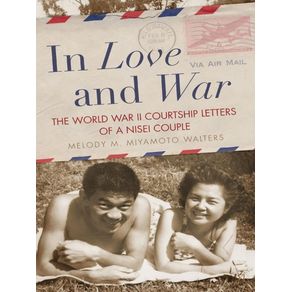The events of December 7, 1941, rocked the lives of people around the world. The bombing of Pearl Harbor had intimate repercussions, too, especially in the territory of Hawaii. In Love and War recounts the wartime experiences of author Melody M. Miyamoto Walters's grandparents, two second-generation Japanese Americans, or Nisei, living in Hawaii. Their love story, narrated in letters they wrote each other from July 1941 to June 1943, offers a unique view of Hawaiian Nisei and the social and cultural history of territorial Hawaii during World War II.
Drawing on her grandparents' letters, Miyamoto Walters fleshes out what it meant to live and work on the islands of Kauai, Oahu, and Hawaii during the war years. Although to outsiders, twenty-somethings Yoshiharu Ogata and Naoko Tsukiyama were both "Japs," the couple came from different socioeconomic classes and cultures. Naoko, the author's grandmother, hailed from a prosperous Honolulu merchant family, whereas Yoshiharu grew up poor, part of the laboring class on a sugar plantation on Kauai. Their courtship was riddled with challenges. He stayed on Oahu, then moved to Kauai; she moved to the Big Island. Yoshiharu faced the possibility of being drafted into the military. After the bombing of Pearl Harbor, they both lived under martial law.
Some Americans, operating under nativist and xenophobic beliefs, questioned Japanese Americans' loyalty to the United States. But, as the letters collected here show, the Nisei were patriots. Naoko and Yoshiharu spoke English, participated in the YMCA and the USO, and taught in public schools. They embraced American popular culture--quoting lines of pop songs in their correspondence--and celebrated both Japanese and American traditions. Through their experiences, Miyamoto Walters shows how Japanese Americans' negotiation of race, ethnicity, and cultural space in wartime indelibly shaped Hawaii's postwar economic, political, and social landscape.

